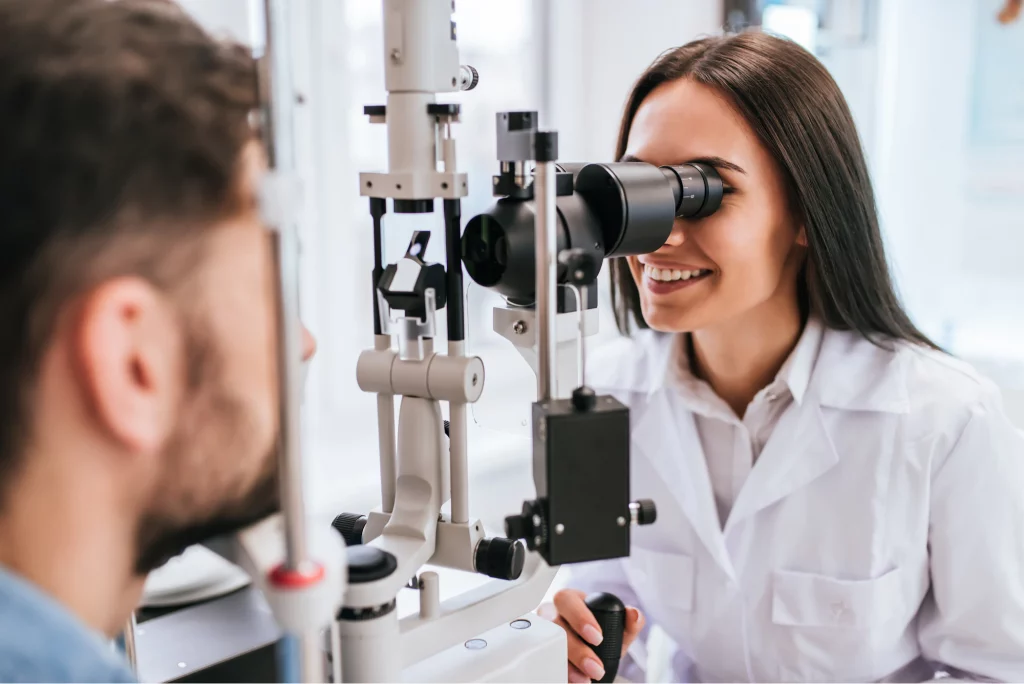Medically Reviewed by: Edward C. Wade, M.D., F.A.C.S.
Why Is My Vision Getting Worse?
Our vision often experiences gradual changes as we age. But what happens when our once sharp sight begins to blur, deteriorate, or face other complications? Is aging the only culprit, or could there be other factors at play?
Why is my vision getting worse? If your vision changes, it’s important to understand why. Here are some common reasons for worsening vision:
- Age-related changes
- Refractive errors
- Eye diseases
- Medications
- Eye injuries
- Lifestyle choices
- Genetics
While some vision changes may be inevitable, there are steps we can take to maintain healthy eyesight as we age. In this article, we’ll delve into several reasons your vision may deteriorate, helping you understand the potential causes and preventative measures.
1. Age-related changes
As we age, our eyes undergo changes that can impact our vision. These changes include:
- Decreased pupil size
- Reduced tear production
- Changes in lens shape and flexibility
These age-related changes may result in presbyopia, a condition where the eye struggles to focus on nearby objects. It’s most commonly experienced by people over the age of 40 and can be characterized by your eye vision getting worse over time. Other age-related eye conditions include cataracts, glaucoma, and age-related macular degeneration (AMD).
2. Refractive errors
Refractive errors occur when the shape of the eye does not bend light properly, resulting in blurred vision. This can be caused by the eyeball growing to be too long or too short, problems with the shape of the cornea, or aging.
Common types of refractive errors include:
- Myopia (nearsighted)
- Hyperopia (farsighted)
- Astigmatism
These conditions can be easily corrected with glasses, contact lenses, or refractive surgery such as LASIK eye surgery, PRK, or EVO ICL.
3. Eye diseases
Eye diseases often pose a significant risk to your eyesight, leading to blurry vision and even blindness. Some common eye diseases include:
- Diabetic retinopathy: A complication of diabetes caused by damage to the blood vessels of light-sensitive tissues at the back of the eye, which can lead to vision loss and blindness.
- Age-related macular degeneration (AMD): The leading cause of vision loss in people over the age of 50 characterized by damage to the macula, the small part of the retina responsible for central vision.
- Glaucoma: A group of eye conditions that damage the optic nerve, often leading to blindness if left untreated.
- Cataracts: Clouding of the lens in the eye, causing blurred vision.
- Keratoconus: A condition where the cornea becomes thin and bulges, causing distorted vision.
With early detection and appropriate treatment, the progression of these diseases can often be slowed or halted. Regular eye check-ups are crucial, particularly for individuals with risk factors such as diabetes or a family history of eye disease or if your eyesight is getting worse all of a sudden.
4. Medications
Certain medications can cause changes in vision or make existing eye conditions worse. These include:
- Corticosteroids are used to treat inflammation and immune system disorders can cause blurred vision.
- Antidepressants may affect tear production and cause dry eyes.
- Medications for high blood pressure, such as beta-blockers, can reduce tear production and create a feeling of dryness.
If you experience any changes in your vision while taking medication, consult your doctor for potential solutions.
5. Eye injuries
Eye injuries, whether minor or severe, can lead to blurry vision or even permanent vision loss. These injuries can occur from a variety of situations like accidents, sports injuries, direct trauma, or exposure to harmful chemicals. Common types of eye injuries that can affect vision include:
- Corneal abrasions: These are scratches on the surface of the eye that can cause blurred vision, along with pain and redness.
- Foreign objects in the eye: Dust, sand, or other tiny particles can enter the eye and cause abrasions, leading to blurry vision.
- Chemical burns: Exposure to harmful chemicals can cause burns on the eye surface, resulting in clouded vision.
- Traumatic iritis: This is inflammation of the iris caused by a blow to the eye, resulting in blurred vision and discomfort.
- Retinal detachment: A severe injury can cause the retina to detach from the back of the eye, causing a sudden and dramatic loss of vision.
If you experience an eye injury, it is essential to seek immediate medical attention. Prompt treatment can prevent permanent damage and preserve vision.
6. Lifestyle choices
Your lifestyle can also have a significant impact on your eyesight. Here are some examples of how certain habits and behaviors can contribute to worsening vision:
- Smoking: Smoking increases the risk of developing cataracts, macular degeneration, and other eye diseases.
- Poor nutrition: A diet lacking in essential vitamins and nutrients can increase the risk of developing cataracts and macular degeneration.
- Excessive screen time: Staring at screens for long periods without breaks can cause eye strain, dryness, and blurred vision. This is known as computer vision syndrome.
- Sun damage: UV damage to the eyes can cause conditions like cataracts and pterygium (growth on the eye’s surface).
- Lack of sleep: Poor or inadequate sleep can lead to eye fatigue, making it more challenging to focus and causing blurry vision.
- Skipping regular eye exams: Routine eye exams can detect potential problems early on, allowing for timely treatment and prevention of further damage.
Making small lifestyle changes such as quitting smoking, incorporating a healthy diet rich in vitamins and minerals, taking breaks from screen time, wearing sunglasses, getting enough sleep, and visiting an eye doctor regularly can help maintain good eyesight.
7. Genetics
Genetics plays a critical role in many eye conditions that can lead to blurry vision. Certain eye diseases, such as glaucoma, age-related macular degeneration (AMD), and retinitis pigmentosa, have a strong genetic component.
For instance, individuals with a family history of glaucoma are significantly more likely to develop the disease themselves. Similarly, certain genetic mutations are known to cause retinitis pigmentosa, a condition that can result in progressive vision loss.
In addition, genetic syndromes such as Marfan syndrome and Down syndrome can also include eye problems as part of their range of symptoms. These conditions may lead to issues like dislocated lenses, early-onset cataracts, or refractive errors, all of which can make your vision blurry.
How do you know if your eyesight is getting worse?
Vision changes can be subtle and may go unnoticed until they become more severe. The following includes several signs that your eyesight could be getting worse:
- Blurred or distorted vision: If you have trouble seeing objects clearly, or if they appear fuzzy or distorted, it could be a sign of worsening eyesight.
- Difficulty seeing at night: Struggling to see in low light conditions, or experiencing increased sensitivity to glare, can indicate a decline in vision.
- Frequent headaches: Blurry vision can cause eye strain, leading to frequent headaches.
- Difficulty reading or working on the computer: If you are having trouble focusing while performing tasks that require near vision, it could be a sign of worsening eyesight.
While it’s common to have concerns about losing your eyesight, especially when you notice things are looking fuzzier, it’s essential to remember that many eye conditions are treatable with early detection and that the signs of going blind are often more apparent such as sudden vision loss without a clear cause (such as an eye injury) or severe symptoms like eye pain.
If you have any concerns about changes to your vision, it’s always best to consult an eye doctor for an evaluation. So, be sure to schedule regular eye exams and follow any treatment plans prescribed by your doctor to maintain good eyesight.
Concerned about your eye vision getting worse? Eye Center of Texas is here for you.
Blurry vision can be caused by various factors such as age, injury, lifestyle choices, and genetics. However, your circumstances are going to be unique to you, so it’s often difficult to get a comprehensive answer to the question, “Why is my vision getting worse?” without speaking to a doctor from Eye Center of Texas in person.
With nationally recognized doctors Dr. Mark L. Mayo and Dr. Edward C. Wade at the helm of Eye Center of Texas’s extremely talented team, patients can expect top-quality treatment and care. While we are most well-known for providing thousands with restored vision via laser cataract surgery and LASIK, we are also highly experienced in other eye health issues both common and rare. For your convenience, we offer locations throughout Texas including:
Want to speak to a doctor today about your vision? Request a consultation with Eye Center of Texas by contacting us online today. Better vision starts here.
More Helpful Articles by Eye Center of Texas:
- 7 Things to Do When Preparing for LASIK Surgery
- What is the Latest Treatment for Dry Macular?
- Why Is There a Bump on my Eyelid?
- What is the Average Cost of LASIK in Texas?
- How to Find the Best Cataract Surgeon in Houston, TX
Related Articles
Financing Options Available
Apply today to find a financing option that meets your needs.
Our Locations
Houston/Bellaire
6565 W. Loop S., Suite 650Bellaire, TX 77401
Medical Office:
713-797-1010
Medical Fax:
713-357-7276
LASIK/Near Vision:
Office: 713-395-1515
Fax: 713-357-7278
Pasadena
4415 Crenshaw RoadPasadena, TX 77504
Medical Office:
281-977-8800
Medical Fax:
281-977-8877
Sugar Land
15200 S.W. Freeway, Suite 130Sugar Land, TX 77478
Medical Office:
281-277-1010
Medical Fax:
281-277-4504
Clear Lake
455 E. Medical Center Blvd., Suite 110Webster, TX 77598
Medical Office:
281-332-1397
Medical Fax:
281-282-9152
Katy
Greenhouse Medical Plaza2051 Greenhouse Road, Suite 110
Houston, TX 77084
Medical Office:
346-547-7070
Medical Fax:
281-214-2971
The Woodlands/Conroe
100 Medical Center Blvd., Suite 118Conroe, TX 77304
Medical Office:
936-647-1610
Medical Fax:
936-647-1620


